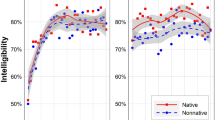Abstract
The effects of speaker expectation of listener competence and the feedback indicative of the listener's comprehension were compared on their power to elicit simplifed speech. The experiment used 2×2 design and a “foreigner” accomplice as a listener in an interview situation. Expectation was varied by having the accomplice introduce herself using either highly accented, dysfluent English or slightly accented, fluent English. The verbal feedback was varied by having the accomplice signal comprehension success (yeah, Ok, or nods) or comprehension failure (what? huh? or frowns and quizzical looks). Forty adult subjects spoke to the accomplice in one of the four conditions. The interviews were taped, transcribed, and scored for measures of mean length of utterance (MLU), false starts/dysfluencies, repetitions/rephrasals, and questions. Analyses revealed that the subjects used shorter MLUs, more repetitions/rephrasals, and more questions when the accomplice signaled comprehension difficulty. When the subjects expected the listener to be linguistically incompetent, they tended to repeat and rephrase more often than when they expected listener competence. It was clear that regardless of the speaker's initial expectation of the listener's linguistic competence, verbal feedback during conversation will elicit simplified speech.
Similar content being viewed by others
Reference Notes
Bohannon, J., Warren-Leubecker, A., & Thompson, D.Context, feedback and four year olds: How children talk to guys'n dolls. Paper presented at the meeting of the Society for Research in Child Development, Boston, April 1981.
Bohannon, J., & Lotz, E.Speech to children's faces. Paper presented at the meeting of the Southeastern Psychological Association, New Orleans, March 1979.
Trieman, R., & Hirsh-Pasek, K.Speech to pets: A study of “doggerel”. Paper presented at the meeting of the Southeastern Conference on Human Development, Alexandria, Virginia, April 1980.
References
Berko-Gleason, J. Some notes on feedback. In C. Snow & C. Ferguson (Eds.)Talking to children: Language input and acquisition. Cambridge, Massachusetts: Cambridge University Press, 1977. Pp 199–205.
Bohannon, J., & Marquis, A. Children's control of adult speech.Child Development, 1977,48, 1002–1008.
Brown, R. Introduction. In C. Snow & C. Ferguson (Eds.),Talking to children: Language input and acquisition. Cambridge, Massachusetts: Cambridge University Press, 1977. Pp. 1–27.
Chomsky, N.Aspects of a theory of syntax. Cambridge: M.I.T. Press, 1965.
Dale, P.Language development (2nd ed.), New York: Holt, Rinehart & Winston, 1976.
Depaulo, B., & Bonvillian, J. The effect on language development of the special characteristics of speech to children.Journal of Psycholinguistic Research, 1978,7, 189–211.
Ferguson, C. Towards a characterization of English foreigner talk.Anthropological Linguistics, 1975,17, 1–17.
Garvey, C. Requests and responses in children's speech.Journal of Child Language, 1975,2, 41–60.
Hatch, E. Discourse analysis, speech acts, and second language acquisition. In W. Ritchie (Ed.),Second language acquisition research: Issue and implications. New York: Academic Press, 1978. Pp 137–155.
Henzl, V. Linguistic register of foreign language instruction.Language Learning, 1974,23, 207–222.
Moerk, E. Verbal interactions between children and their mothers during the preschool years.Developmental Psychology, 1975,11, 788–794.
Newport, E. Motherese: The speech of mothers to young children. In N. Castellan, D. Pisoni, & G. Potts (Eds.),Cognitive theory (vol. 2). Hillsdale, New Jersey: Erlbaum, 1976.
Sachs, J., & Devin, J. Young children's use of age appropriate speech styles in social interaction and role-playing.Journal of Child Language, 1976,3, 81–98.
Snow, C. Mother's speech to children.Child Development, 1972,43, 549–569.
Snow, C., & Ferguson, C. (Eds.).Talking to children: Language input and acquisition. Cambridge, Massachusetts: Cambridge University Press, 1977.
Wagner-Gough, J., & Hatch, E. The importance of input data in second language acquisition studies.Language Learning, 1975,25, 297–308.
Author information
Authors and Affiliations
Additional information
A preliminary report of this paper was delivered at the Southeastern Psychological Association, Atlanta, March 1981.
Rights and permissions
About this article
Cite this article
Warren-Leubecker, A., Bohannon, J.N. The effects of expectation and feedback on speech to foreigners. J Psycholinguist Res 11, 207–215 (1982). https://doi.org/10.1007/BF01067564
Accepted:
Issue Date:
DOI: https://doi.org/10.1007/BF01067564




